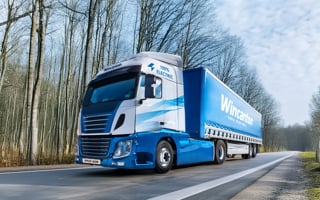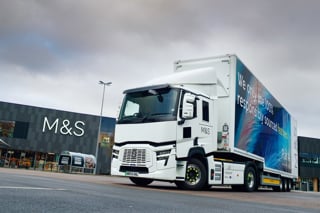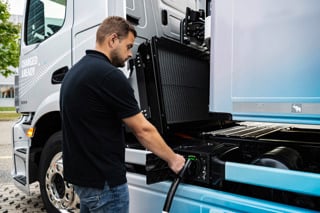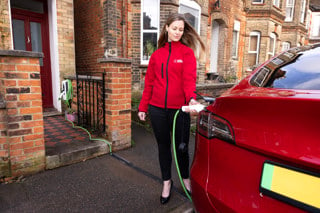A new £1.4 million charging station for electric heavy goods vehicles (HGVs) has gone live at the Nissan Sunderland Plant.
The facility has seven charging stations, capable of powering up to 10 electric HGVs simultaneously, and establishes an electric, end-to-end supply chain that transports materials into the Nissan plant and delivers finished vehicles out.
It complements the plant's EV36Zero vision for sustainable manufacturing, bringing together electric vehicles (EVs), renewable energy and battery production.
Michael Simpson, vice president supply chain management at Nissan Amieo, said: “It is fantastic for our plant to be leading the charge to an electrified supply chain with this project.
“We welcome the support we've received from our partners to bring the charging station to life and we're proud of what we have achieved.
“The charging station looks brilliant and is a big step forward in Nissan's EV360 vision, which brings together electric vehicles. zero carbon energy and battery manufacturing.”
The station will support 60 UK electric HGV deliveries to the plant daily and, says Nissan, represents just the start of the plant's journey towards electrifying its supply chain.
Simpson added: “We’re exploring further opportunities to allow other hauliers to use the charging station as well as looking at other opportunities to maximise its full potential.”
The charging station will support a fleet of 25 trucks with a charging capacity of up to 360kW.
The trucks will collect parts from Nissan's UK supply base stretching as far afield as Derby; as well as delivering finished vehicles to and from the Port of Tyne.
That, says Nissan, equates to more than 2.4 million kilometres (1.5m miles) travelled per year, fully electrified, saving 1,500 tonnes of CO2 annually.
Bringing together Nissan, Fergusons, Yusen and BCA, the project is part of the Electric Freightway consortium that is transforming sustainable freight logistics through deployment of electric HGVs and high-power charging infrastructure.
Led by Gridserve, Electric Freightway forms part of the Zero Emission HGV and Infrastructure Demonstrator programme, funded by the UK Government and delivered in partnership with Innovate UK.
UK Government minister for the future of roads, Lilian Greenwood, said: “We’re working closely with the road freight sector to slash transport emissions, and our £200m zero emission HGV programme is helping businesses across the country to power the electrification of its fleets.
“It’s great to see Nissan taking advantage of our scheme which is supporting high paid jobs and putting money in the pockets of working people.”
Daniel Kunkel, CEO at Gridserve, added: “The decarbonisation of transport logistics is much stronger and reaches far wider when done in partnership.
“This is why, as leaders of the Electric Freightway consortium, we are so pleased to support this UK first with Nissan and their haulage partners.
“Depot charging is critical for the electrification of HGVs, going hand in hand with future public infrastructure developments.
“As a first shared usage site, this location is leading the way in sustainable freight logistics.”
The electric HGV charging depot comes as the Government has launched a new depot charging scheme for fleets with a £30 million fund, which was announced on Sunday (July 13).
Eligible businesses will have the opportunity to claim up to 75% of the costs associated with charger procurement and installation back, with a cap of £1m per applicant applicable to all sites.
The addition of another trier of sustainability at Nissan also comes as the Government stressed its new £650m electric car grant would be based on a carmaker’s sustainability standards.
The ‘greenest’ vehicles in band one will receive up to £3,750, with band two vehicles receiving up to £1,500.


























Login to comment
Comments
No comments have been made yet.